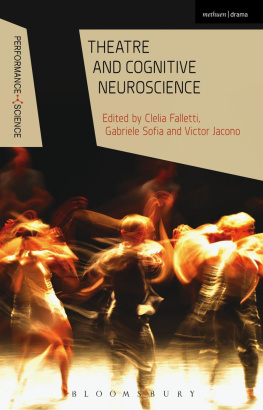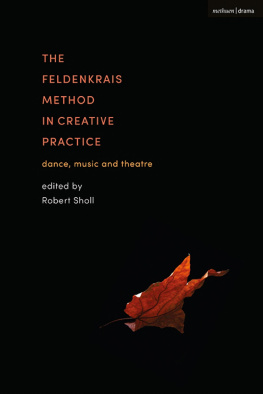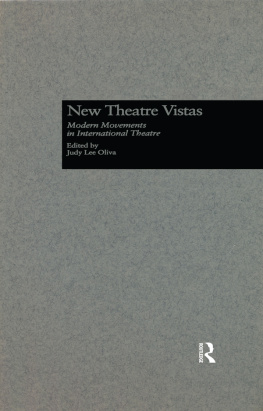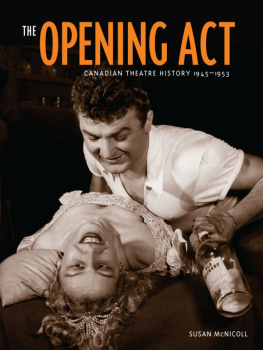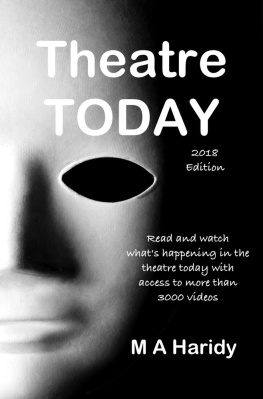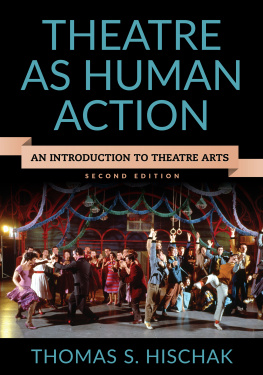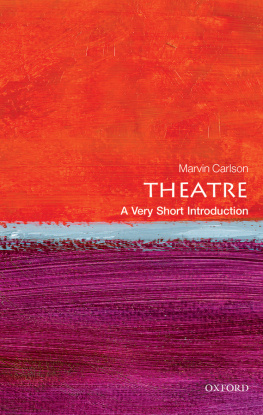To those who live at the crossroads
Performance and Science: Interdisciplinary Dialogues explores the interactions between science and performance, providing readers with a unique guide to current practices and research in this fast-expanding field. Through shared themes and case studies, the series offers rigorous vocabularies and methods for empirical studies of performance, with each volume involving collaboration between performance scholars, practitioners and scientists. The series encompasses the modalities of performance to include drama, dance and music.
SERIES EDITORS
John Lutterbie
Chair of the Departments of Art and of Theatre Arts at Stony Brook University, USA
Nicola Shaughnessy
Professor of Performance at the University of Kent, UK
IN THE SAME SERIES
Affective Performance and Cognitive Science
edited by Nicola Shaughnessy
ISBN 978-1-4081-8398-4
Performance and the Medical Body
edited by Alex Mermikides and Gianna Bouchard
ISBN 978-1-4725-7078-9
Theatre, Performance and Cognition:
Languages, Bodies and Ecologies
edited by Rhonda Blair and Amy Cook
IBSN 978-1-4725-9179-1

CONTENTS
Clelia Falletti, Gabriele Sofia and Victor Jacono
Clelia Falletti
Maria Alessandra Umilt
Giorgia Committeri and Chiara Fini
Philippe Goudard
Gabriele Sofia
Marco De Marinis
Corinne Jola and Matthew Reason
Lorraine Dumenil
Victor Jacono
John J. Schranz
Gabriele Sofia, Silvia Spadacenta, Clelia Falletti, and Giovanni Mirabella
Luciano Mariti
Giovanni Mirabella
Jenna Gabriel, Elisa Angevin, Tamara E. Rosen and Matthew D. Lerner
Nicola Modugno, Imogen Kusch and Giovanni Mirabella
Jean-Marie Pradier
Figures
Original stimuli: digitized images of the artworks by Lucio Fontana. Control stimuli: digitized images of graphically modified versions of the original artworks.
Original stimuli: digitized images of the artworks by Franz Kline. Control stimuli: digitized images of graphically modified versions of the original artworks.
Exemplar stimuli for the experimental conditions used in the allocentric task of extrapersonal space categorization. Modified from Chiara Fini, Marcel Brass, Giorgia Committeri, Social Scaling of Extrapersonal Space: Target Objects Are Judged as Closer When the Reference Frame Is a Human Agent with Available Movement Potentialities, Cognition 134 (2015).
Exemplar stimuli for the experimental conditions used in the egocentric task of extra-personal space categorization. Modified from Chiara Fini, Marcello Costantini, Giorgia Committeri, Sharing Space: The Presence of Other Bodies Extends the Space Judged as Near, PlosOne, 9(12) (2014).32
Effect of presence experiences on enjoyment ratings (Corinne Jola, Matthew Reason).
Effects of proximity on sensorimotor simulation (Corinne Jola, Matthew Reason).
Effects of co-presence on sensorimotor simulation (Corinne Jola, Matthew Reason).
The age of the subjects of the experiment (Gabriele Sofia, Silvia Spadacenta, Giovanni Mirabella, Clelia Falletti).
Schematic representation of the mechanism underlying Experiment 1 (Gabriele Sofia, Silvia Spadacenta, Giovanni Mirabella, Clelia Falletti).
Coronal view of the brain, reproduced with permission from Jos A. Obeso, Maria C. Rodrguez-Oroz, Manuel Rodrguez, Javier Arbizu, Jos M. Gimnez-Amaya, The Basal Ganglia and Disorders of Movement: Pathophysiological Mechanisms, News in Physiological Science 17 (2002), pp. 5155.179
Tables
Distribution of audiences evaluations of proximity and co-presence (Corinne Jola, Matthew Reason).
Elements of theatre and cognitive models of ASD they may inform.
Elisa Angevin, Student in the Applied Psychology program, New York University USA.
Giorgia Committeri, Associate Professor, Department of Neuroscience and Imaging, Laboratory of Neuropsychology and Cognitive Neuroscience, University G. dAnnunzio, Chieti, and ITAB, Foundation G. dAnnunzio, Chieti, Italy.
Marco De Marinis, Professor of Theatre, University of Bologna, Italy.
Lorraine Dumenil, PhD in History and Semiology of the text and the Image. Member of the THALIM research team (Universit Paris III-Sorbonne Nouvelle, France). Art History and Literature teacher.
Clelia Falletti, Associate Professor of theatre studies at Sapienza University of Rome, Italy.
Chiara Fini, Department of Experimental Psychology, Ghent University, Belgium; Laboratory of Neuropsychology and Cognitive Neuroscience, Department of Neuroscience, Imaging and Clinical Sciences, University G. dAnnunzio, Chieti, and ITAB, Foundation G. dAnnunzio, Chieti, Italy.
Jenna Gabriel, Graduate in Drama and minors in Applied Theatre and Child and Adolescent Mental Health Studies, New York University, USA.
Philippe Goudard, MD, circus artist and producer, theatre actor, and researcher, Professor of performing arts and Assistant Director of the programme Cirque: histoire, imaginaires, pratiques (RIRRA21/Universit Paul Valry Montpellier, France).
Victor Jacono, PhD in Performance Studies (Sapienza University of Rome, Italy), theatre maker and educator.
Corinne Jola, Lecturer in Psychology, School of Health and Social Sciences, Abertay University, Dundee, UK.
Imogen Kusch, Theatre Director and founder of Klesidra Theatre, Rome, Italy.
Matthew D. Lerner, Assistant Professor, Department of Psychology, Stony Brook University, and Director of the Stony Brook Social Competence & Treatment Lab (SCTL), USA.
Luciano Mariti, Professor of Theatre, Sapienza University of Rome, Italy.
Giovanni Mirabella, Assistant Professor, Department of Physiology and Pharmacology, Sapienza University of Rome, and Scientific Consultant at IRCCS Neuromed Hospital, Pozzilli (IS), Italy.
Nicola Modugno, Department of Physiology and Pharmacology, Sapienza University of Rome, Founder and President of the onlus ParkinZone, and Chief of the Parkinson Centre of IRCCS Neuromed Pozzilli (IS), Italy.
Jean-Marie Pradier, Professor Emeritus of the University of Paris VIII, France, founding member of the International School of Theatre Anthropology (ISTA), and the founder of the Laboratoire dEthnoscnologie, MSH Paris Nord.
Matthew Reason, Professor, Faculty of Arts, York St John University, UK.
Tamara E. Rosen, PhD student, Member of the Social Competence & Treatment Lab (SCTL) of Stony Brook University, USA.
John J. Schranz, Senior Lecturer in Theatre Studies, University of Malta, pedagogue-director, deviser of the interdisciplinary research programme xHCA Questioning Human Creativity as Acting, Malta.
Gabriele Sofia, Contract lecturer in theatre studies and physical theatre at Paul Valry University, Montpellier, France. Researcher of the RIRRA21 (Paul Valry University) and Maison des Sciences de lHomme Paris Nord.
Silvia Spadacenta, Post-doc researcher Hertie Institute for Clinical Brain Research and Eberhard Karls Universitt, Tbingen, Germany.
Maria Alessandra Umilt, Research Fellow in Physiology, Department of Neuroscience, University of Parma, Italy.
The editors would like to thank the Faculty of Literature, Philosophy, Humanities and Oriental Studies at the Sapienza University of Rome, and the Department of Media, Visual and Performing Arts at the University of Bologna for their important contributions toward the publication of the present volume.
Next page
